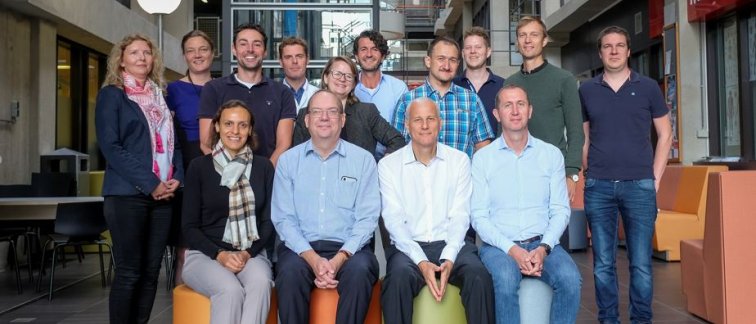In the PERMEABLE consortium (PERsonalized MEdicine Approach for asthma and allergy Biologicals seLEction) European researchers & IT experts from The Netherlands, Germany, Sweden, and Slovenia work together to develop the urgently needed personalized medicine approach for children with severe allergic diseases. Within their research they look for novel noninvasive biomarkers in breath and blood that can guide each patient's treatment. The consortium uses innovative laboratory techniques to study disease mechanisms and identify novel drug targets. Susanne Vijverberg, from the Amsterdam institute of Infection and Immunity and Amsterdam Public Health is the Principal Investigator of the PERMEABLE consortium, in this article she shares her views on this fascinating consortium.
A total of 50 million Europeans suffer from allergic diseases such as asthma and atopic dermatitis. About 10% of patients with asthma and atopic dermatitis suffer from uncontrolled disease despite high doses of steroids. These patients may benefit from innovative targeted, but also expensive and burdensome treatments, called biologicals. Transparent access to biologicals and systematic assessment of treatment response are lacking, especially for young patients, leading to patient discomfort and a public health burden. The goal of the multidisciplinary PERMEABLE consortium is to develop the urgently needed personalized medicine approach for safe and effective access to biologicals for allergy patients across Europe, based on individual susceptibility to molecular mechanisms targeted by available biologicals.
To date, the PERMEABLE consortium succeeded in understanding the current status of biologics use in Europe, identifying new biomarkers associated with clinical response, and bringing together European experts inside and outside the consortium to move this field forward. Dr. Vijverberg: "these are all important steps in bringing personalized medicine for young patients to clinical practice, but we are not there yet."
Differences in treatment effectiveness
Important in the treatment of children with severe allergies are the so far unexplained differences between them. Dr. Vijverberg: "One question where we are still in the dark is: why do novel targeted therapies work in one group of children but not in another? We are not only looking at these differences, and investigating why these differences occur, we also want to identify new treatment strategies within our consortium. Our ultimate goal is to develop precision medicine strategies to improve the treatment of severe allergic diseases in children”.
To this end, the PERMEABLE consortium combines clinical research, advanced preclinical studies and cloud-based IT solutions. “For our clinical research, we are following a pan-European cohort of young biologics users, which has been a struggle in recent years because of COVID-19, unfortunately we have therefore not been able to include as many patients as we would have liked. For the preclinical studies, we have innovative functional cell models and non-invasive omics to develop clinical applications. Last but not least, we need scalable, cloud-based IT solutions for our consortium. Here we have access to multilingual software for data management, big data analysis, and clinical decision making.” Dr. Vijverberg says.
Biologics, disposable breath sampling and airway epithelial model
The PERMEABLE consortium to date has established a real-life European clinical cohort of biological drug users. Within this cohort, they want to assess whether omics profiling before the start of treatment with biologicals can predict treatment outcome. Omics profiling is a technique to look at biological processes within an individual at different levels and in different tissues (e.g., blood/exhalation), this helps to better understand the biological processes that influence inflammatory mechanisms underlying disease and response to treatment. Dr. Vijverberg: "With omics profiling, we aim to detect changes in gene expression over time in relation to poor treatment outcomes, such as asthma exacerbations despite biologics use."
Another ongoing project is the disposable breath sampling test to assess breath metabolomics. This project is led by Dr. Paul Brinkman, who is developing the disposable breath test with his group. Dr. Vijverberg explains: "Breath metabolomics consists of measuring volatile organic compounds (VOCs) in exhaled breath. Endogenous VOCs can originate from inflammatory processes in the airways (e.g., airway inflammation in asthma ). Better diagnosis of the underlying inflammatory process in a patient could provide more insight into which patients respond or do not respond to anti-inflammatory treatments. Biologicals, for example, also target specific inflammatory mediators."
Last but not least the consortium has developed an airway epithelial model to assess ex vivo treatment response to biologicals, led by Dr. Kornel Golebski and Dr. Kees van Drunen. "It is generally believed that airway epithelium plays an active role in immune responses. There is a large degree of overlap between the epithelial composition of upper and lower airways. Within the PERMEABLE consortium, we have developed an airway epithelial model to assess the functional effects of the asthma-like phenotype on treatment response. This helps us understand the cellular processes that influence the response to inflammatory treatment," Dr. Vijverberg says.
Don't let adversity stop you
During the COVID-19 pandemic, July 2020, the PERMEABLE consortium had planned a first progress meeting in Stockholm. However, this unfortunately could not take place due to travel restrictions. Dr. Vijverberg: "At first we were very disappointed. But eventually we decided to make the best of it and change the progress meeting to an online event, which we called the virtual Stockholm meeting. At this meeting, we invited our PERMEABLE members and external key opinion leaders. The online meeting was more successful than we ever expected, it led to the publication of a European roadmap paper to address the unmet needs and priorities of pediatric asthma patients on biologic therapy."
Out into the wider world with the research findings
In the spring of 2023, the PERMEABLE consortium will end in its current form. The goal of Dr. Vijverberg and colleagues is to have completed their research analyses on omics profiling, the disposable breath sampling test and the airway epithelial model by then. Dr. Vijverberg: "I look forward to the publication of our results, they look promising. Furthermore, we would like to continue our consortium, incidentally we are working on a new project proposal, in the hope that this will provide a go-ahead."

Get to know Susanne Vijverberg
Dr. Vijverberg is a Principal Investigator at the Department of Pulmonology and Pediatric Pulmonology at Amsterdam UMC, in the Precision Medicine group of Prof. Dr. Anke-Hilse Maitland van der Zee. Within her research projects, Dr. Vijverberg focuses on developing precision medicine approaches for children with severe respiratory diseases, such as severe asthma. In addition, Dr. Vijverberg is chair of the Young Investigators Board of the Dutch Respiratory Society, and Early Career Member representative of the Pediatrics Assembly at the European Respiratory Society. What Dr. Vijverberg advocates for is patient participation in science, during her career she has established two patient advisory boards, one with adults and one with adolescents, a project she can be proud of. In 2019 Dr. Vijverberg was awarded the Prof. Sterk Participation Award by the Lung Foundation Netherlands to acknowledge her great focus on patient participation. Dr. Vijverberg is the mother of Lena (age 4) and Teun (age 1), and the partner of Mattijs, whom she describes as her favorite IT nerd.
For more information contact Dr. Susanne Vijverberg or visit the PERMEABLE website.
Text: Esmée Vesseur
Read our previously published articles starring researchers from the Inflammatory Diseases program:
- Anke-Hilse Maitland-Van der Zee has been nominated as Guiding Star by TOPX (August 2022)
- Longfonds talk with Susanne Vijverberg (June 2022)
- Kornel Golebski has received Allergy's Top Reviewer Award (February 2022)

